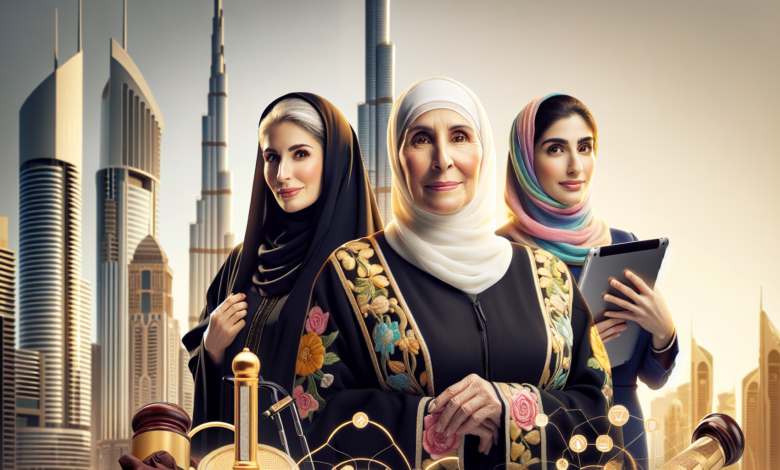
Women in the UAE: A Progressive Portrait of Change
Women in the United Arab Emirates: A Portrait of Progress has become a compelling narrative of transformation and empowerment. Over the past few decades, the UAE has witnessed remarkable advancements in women’s rights and opportunities, reshaping the social landscape and challenging traditional norms. This shift has had a profound impact on the nation’s economic growth, social welfare, and cultural heritage, positioning UAE women at the forefront of national development.
The journey of women’s empowerment in the UAE spans various spheres, including education, entrepreneurship, and political participation. From increased workforce participation to holding leadership roles in both the public and private sectors, women have made significant strides. The government’s commitment to gender equality is evident through progressive policies, such as extended maternity leave and the promotion of women to Cabinet positions. These changes not only highlight the achievements of UAE women but also underscore the country’s dedication to fostering a more inclusive society while honoring its Islamic principles.
Legal Empowerment of Women in the UAE
The United Arab Emirates has made significant strides in empowering women through legal frameworks and policies. This commitment to gender equality has positioned the UAE as a leading country in the region, as recognized by the World Economic Forum’s 2024 Global Gender Gap Report.
Constitutional Rights
The UAE Constitution serves as the cornerstone for women’s legal empowerment. It guarantees equal rights for all citizens, regardless of gender. Under this framework, women enjoy the same legal status as men, including access to education, the right to practice professions, and the right to inherit property. This constitutional foundation has had a profound impact on the advancement of women’s rights in the country.
Personal Status Laws
The UAE has implemented progressive personal status laws to protect and empower women. Federal Law No. 28 of 2005 on Personal Status, as amended, governs various aspects of personal affairs for UAE citizens. This law covers marriage, divorce, child custody, and inheritance. In a groundbreaking move, as of February 1, 2023, the UAE introduced Federal Law No. 41 of 2022, which recognizes civil marriage for non-Muslim expats. This new law aims to provide greater legal equality and protection for non-Muslim residents.
The introduction of civil marriages has eased the divorce process by circumventing the mandatory appeal to the family guidance committee. It also provides spouses seeking separation with more flexibility and greater legal protection in asset division. Additionally, the new law establishes joint custody as the general principle after divorce, prioritizing the psychological well-being of children.
Labor Protections
The UAE has implemented robust labor laws to ensure the safety and protection of all workers, including women. Federal Decree Law No. 33 of 2021 on the Regulation of Labor Relations in the Private Sector addresses issues such as harassment, bullying, and discrimination based on gender, race, or other factors. This law prohibits forced labor and sets clear obligations for employers.
Women in the UAE benefit from specific protections in the workplace. Female employees are entitled to 45 days of fully paid maternity leave, covering both pre and postnatal periods. After completing one year of continuous service, they may qualify for an additional 45 days of unpaid leave. The law also allows for extended unpaid leave in case of pregnancy-related illnesses.
The UAE’s commitment to gender equality in the workforce is evident through various initiatives. The country has mandated the inclusion of women on the boards of directors of federal bodies and private companies. As a result, women now occupy 66% of public sector jobs, with 30% in senior leadership positions. The establishment of the UAE Gender Balance Council in 2015 further demonstrates the government’s dedication to achieving gender balance in the workplace.
These legal empowerment measures have contributed to the UAE’s impressive rankings in various global indices. The country had the highest number of women on Forbes’ 100 Most Powerful Arab Businesswomen list in 2023, and women business owners account for 10% of the total private sector. Furthermore, the UAE is ranked 40th globally for advancing women’s political empowerment, with women comprising 50% of the Federal National Council.
Education as a Cornerstone of Progress
Historical Development
The United Arab Emirates has undergone a remarkable transformation in its approach to education, particularly for women. In the early days before the formation of the federal union, it was socially unacceptable for women to leave their homes for schooling. Schools primarily catered to males and were taught by male teachers. The few female teachers available were often brought from other countries like Jordan.
Recognizing the importance of education for all citizens, the UAE government took proactive steps to change social behaviors that hindered women’s education. They implemented innovative strategies to persuade traditional families, offering numerous benefits to girls attending school. These incentives included providing tailored uniforms, money for shoes, two full course meals with desserts daily, and even pocket money. The government’s commitment extended to bringing medically equipped vans for dental care and other health checks.
Current Statistics
The UAE’s efforts have yielded impressive results. Today, the literacy rate among women in the UAE stands at an impressive 95.8%, surpassing the male literacy rate of 93.1%. This marks a significant improvement from 1975 when the female literacy rate was only 31% compared to 54% for males.
In higher education, women’s participation has soared. At two of the nation’s three federal institutions of higher learning, women comprise between 80% and 90% of the student population. The United Arab Emirates University, the country’s oldest and highest-ranking university, boasts a female student body of around 81%.
The commitment to women’s education is evident in the following statistics:
- 95% of female high school graduates pursue further education at tertiary-level institutions, compared to 80% of males.
- Women constitute almost two-thirds of students attending government universities and over half at private tertiary-level institutions.
- 77% of Emirati women enroll in higher education after secondary school.
- Women make up 70% of all university graduates in the UAE.
Impact on Society
The emphasis on women’s education has had a profound impact on UAE society. It has contributed significantly to the nation’s economic diversification and prepared a new generation ready to compete in the global marketplace. The UAE’s commitment to education has positioned it as a regional hub for learning, attracting talented students from the Arab world and beyond.
The focus on STEM education has been particularly noteworthy. Women account for 56% of the UAE’s graduates in STEM courses at government universities. At the Masdar Institute of Science, 60% of Emirati graduate students are female, highlighting the country’s progress in promoting gender equality in traditionally male-dominated fields.
The impact extends beyond academia into the workforce. Women now make up almost half of the country’s workforce, at around 43%. This high level of participation has contributed to the UAE’s economic growth and social development.
The UAE’s success in educating women has gained international recognition. In 2020, young people surveyed throughout the Arab world identified the UAE as the top country to live in and emulate for the ninth consecutive year, reflecting the opportunities available to youth entering the workforce.
Economic Empowerment and Entrepreneurship
The United Arab Emirates has made significant strides in promoting economic empowerment and entrepreneurship among women. This progress is evident across various sectors, from workforce participation to business ownership and government initiatives.
Women in the Workforce
The UAE has witnessed a remarkable increase in women’s participation in the workforce. As of 2015, women occupy 66% of public sector jobs, one of the highest proportions worldwide. Notably, 30% of these positions are in senior leadership roles associated with decision-making. This high level of participation extends to the private sector, where women actively contribute in various capacities, including as entrepreneurs and managers.
The country’s commitment to gender equality in the workplace is reflected in its labor laws. The UAE Labor Law mandates equal wages for men and women performing the same work. This commitment was further strengthened in 2018 when the UAE Cabinet approved a law on equal wages and salaries for women and men, aligning with the government’s objective to protect women’s rights and support their role in national development.
Business Ownership
Women’s entrepreneurship in the UAE has seen significant growth, with women business-owners accounting for 10% of the total private sector. According to recent data, 23,000 Emirati businesswomen run projects worth over AED 50 billion. These women entrepreneurs also occupy 15% of the positions on the boards of chambers of commerce and industry nationwide.
The UAE’s support for women in business has gained international recognition. In 2020, the country had the highest number of women among the 100 Most Powerful Arab Businesswomen listed by Forbes. This achievement underscores the strong entrepreneurial culture in the region, where businesswomen demonstrate financial independence and management skills while promoting sustainability in their enterprises.
Government Initiatives
The UAE government has implemented various initiatives to support and encourage women’s economic empowerment and entrepreneurship. These efforts aim to improve the sustainability of economic sectors and diversify the sources of national income.
- National Strategy for Empowerment of Emirati Women: Launched on March 8, 2015, by Sheikha Fatima bint Mubarak, this strategy provides a framework for government, private sector, and civil society organizations to establish work plans for women’s empowerment.
- Dubai Business Women Council: This organization is dedicated to the professional and personal growth of businesswomen and female entrepreneurs in the UAE. It provides access to finance, coaching, and networking opportunities.
- Khalifa Fund for Enterprise Development (KFED): This fund runs targeted financing and training initiatives to aid in the establishment and expansion of businesses, with a focus on women entrepreneurs.
- Dubai SME: An integrated division of the Department of Economic Development, Dubai SME supports SMEs and entrepreneurs in Dubai, offering mentorship and training to aid business owners, particularly women.
- Board Representation Mandate: In 2021, the UAE Security and Commodities Authority issued a mandate requiring listed companies to have at least one woman on their board of directors.
These initiatives, combined with the UAE’s progressive laws and societal trends, have created diverse opportunities for female entrepreneurs in the Middle East. However, challenges remain, including cultural norms, gender bias in investment opportunities, and the need for work-life balance. Addressing these issues will be crucial for the continued growth and success of women’s economic empowerment and entrepreneurship in the UAE.
Political Participation and Leadership
The United Arab Emirates has made remarkable strides in advancing women’s participation in political leadership and decision-making roles. This progress is evident across various sectors, from parliamentary representation to diplomatic positions.
Milestones in Political Representation
The UAE has achieved significant milestones in women’s political representation. In 2015, Dr. Amal Al Qubaisi made history as the first woman in the Arab world to be elected as speaker of the Federal National Council (FNC), the UAE’s consultative parliamentary body. This achievement marked a turning point for women’s leadership in the region.
Women now comprise 50% of the FNC seats, one of the highest percentages globally. This achievement has positioned the UAE as the only country in the MENA region to achieve parity at the parliamentary level. According to the World Economic Forum’s Global Gender Gap Report 2024, the UAE ranks 40th globally for advancing women’s political empowerment.
The UAE Cabinet also reflects this commitment to gender balance. As of 2022, nine out of 33 ministerial positions are held by women, representing 27.3% of roles. These positions cover crucial portfolios such as international cooperation, climate change and environment, community development, and food and water security.
Women in Diplomacy
Women’s participation in diplomacy has seen significant growth in recent years. By 2023, the UAE had 12 female ambassadors, permanent representatives, and consul-generals posted worldwide. Additionally, 19 women serve as directors and deputy directors at the Ministry of Foreign Affairs and International Cooperation (MoFAIC). This represents 43% of the country’s diplomatic corps members and 11% of the total number of ambassadors, the highest rate regionally.
A notable example is Her Excellency Ambassador Lana Nusseibeh, who became the UAE’s first female Permanent Representative to the UN in 2013. During her tenure, she achieved several milestones, including being elected as the first Arab female president to lead the UN Women Executive Board in 2017.
Future Goals
The UAE continues to set ambitious goals for women’s political participation and leadership. The establishment of the Gender Balance Council in 2015 demonstrates the country’s commitment to reducing the gender gap across all government sectors and achieving gender balance in decision-making positions.
The UAE aims to strengthen its position in global competitiveness reports and transform into a landmark for gender equality. To achieve this, the country has implemented several initiatives, including:
- The Gender Equality Manual, developed in cooperation with the Organization for Economic Cooperation and Development (OECD).
- The Gender Equality Index, issued annually by the United Nations Development Program (UNDP).
- A national program on alternative employment options for women, launched in 2018.
These efforts have already yielded positive results, with the UAE ranking eighth globally in the sub-index on equal pay for equal work, according to the 2016 World Economic Forum report on closing the gender gap.
As the UAE continues to invest in women’s education and inclusion in the public sector, it is expected that women’s participation in political leadership and diplomacy will further increase, solidifying the country’s position as a regional leader in gender equality and women’s empowerment.
Social and Cultural Transformation
The United Arab Emirates has undergone a remarkable social and cultural transformation, particularly in the realm of women’s roles and status. This shift has been driven by a combination of government initiatives, educational advancements, and changing societal attitudes.
Changing Perceptions
The trajectory of women’s empowerment in the UAE finds its roots in the visionary ideals of the late Sheik Zayed bin Sultan Al Nahyan, the nation’s founding father. His emphasis on education and equal opportunities, regardless of gender, laid the cornerstone for the UAE’s steadfast commitment to advancing women’s rights and status. This vision has been carried forward by President His Highness Sheik Mohamed bin Zayed Al Nahyan, who has emerged as an unwavering ally in the pursuit of women’s empowerment.
The landscape of gender roles began to shift notably after pivotal oil discoveries in 1958, catalyzing a gradual transformation in the roles and contributions of Emirati women within society. Today, these women emerge as trailblazers, fearlessly shattering societal norms to accomplish remarkable feats.
Women in Non-Traditional Roles
Emirati women have made significant strides in fields traditionally dominated by men. The country now boasts its first female pilot at the General Civil Aviation Authority, the first female judge in the history of the UAE, and the first Army Brigadier. These pioneering women serve as role models for future generations.
In the realm of arts and culture, women have also begun making rapid and impressive strides. They are active members of cultural authorities and boards directing government strategy in the fields of culture, arts, and music. Their contributions to the UAE’s cultural growth are increasingly recognized and celebrated.
Balancing Tradition and Progress
The UAE’s journey towards gender equality is characterized by a delicate balance between preserving cultural heritage and embracing modernization. While traditional values of family and obedience to parental authority are changing, Emirati youth are beginning to identify themselves as individuals and seek what is best for them.
The majority of female students now believe that their education provides them with a sense of autonomy and independence. They expect to have control over their futures, including decisions about marriage, childbearing, and career choices. However, these emerging changes in cultural practices, beliefs, and values are being integrated into the traditional Emirati culture, creating a unique blend of old and new.
Emirati Women’s Day, celebrated annually on August 28 since 2015, serves as a poignant reminder of the collective dedication that has transformed the UAE into a dynamic society where women’s contributions are not just acknowledged, but proactively nurtured and celebrated. This day marks the anniversary of the creation of the UAE’s General Women’s Union and symbolizes the nation’s commitment to gender equality and women’s empowerment.
Health and Well-being
Access to Healthcare
The United Arab Emirates has made significant strides in ensuring comprehensive healthcare for women. The country offers a wide range of services covering physical, mental, emotional, and social well-being. Public hospitals provide affordable or free care, while private facilities offer services through insurance, ensuring healthcare accessibility for all women.
Women’s healthcare in the UAE addresses unique needs at different life stages. Services include gynecological exams, breast health screenings such as mammograms and ultrasounds, family planning consultations, and prenatal care. To enhance accessibility, the government has introduced awareness campaigns encouraging regular check-ups and early disease detection. Public-private partnerships have been pivotal, offering specialized packages for women’s health check-ups with discounts on screenings and consultations.
For expatriates, accessing healthcare services is straightforward with medical insurance. Hospitals offer tailor-made packages based on age, sex, and personal medical history. Healthcare centers, both public and private, have websites and helplines allowing appointments by phone or online. While there is no government health scheme for foreigners, employers are legally required to provide medical insurance to employees.
Maternal Health Initiatives
The UAE has implemented comprehensive maternal health initiatives to ensure the well-being of expectant mothers and their children. Pregnant women are entitled to extensive prenatal care through dedicated maternity clinics and hospitals. Regular check-ups during pregnancy help monitor maternal health and fetal development while addressing any potential complications.
The country has introduced initiatives such as antenatal classes, where expectant parents can learn about childbirth techniques, early parenting skills, and newborn care practices. The UAE’s commitment to comprehensive maternal care ensures the well-being of women during this transformative phase.
Breastfeeding has become a significant movement in the UAE, with new mothers encouraged to avoid formula milk for the first 18 months. A law requires employers to provide two mandatory half-hour nursing breaks to women who have returned from maternity leave until the child is 18 months old.
Mental Health Support
The UAE has made substantial progress in prioritizing mental health support for women. Mental health awareness is increasing, with the country spearheading efforts through conferences and workshops focusing specifically on women and children. There are numerous counseling and psychiatry centers, such as the LightHouse Arabia Center for Wellbeing and Camali Clinic: Child and Adult Mental Health in Dubai, and the National Rehabilitation Center in Abu Dhabi, providing highly trained psychiatrists and mental health experts.
Support groups utilizing social media and community meet-up platforms, such as With Hope UAE run by Emirati women, address issues like sexual abuse, workplace harassment, and depression. The UAE government is actively undertaking measures to address mental health issues and reduce associated stigma, providing access to mental health services for both Emiratis and expatriates.
The UAE’s journey in advancing women’s rights and opportunities has had a profound impact on the nation’s social, economic, and political landscape. From education to entrepreneurship, and from healthcare to political leadership, women in the UAE have made remarkable strides, breaking barriers and reshaping traditional norms. This progress has not only empowered women but also contributed to the country’s overall growth and development.
Looking ahead, the UAE’s commitment to gender equality and women’s empowerment continues to shape its vision for the future. The country’s efforts to balance tradition with progress, coupled with its focus on education and innovation, set a strong foundation to further enhance women’s roles in society. As the UAE moves forward, the continued advancement of women’s rights and opportunities will likely play a crucial part in its journey toward becoming a global leader in gender equality and social progress.







[…] The timing matters greatly because the Defense Department must make critical decisions about force modernization. International conflicts and strategic competition with rival powers make this nomination’s […]
[…] Authority for Identity and Citizenship controls data management strictly. It follows Federal Decree-Law No. 45 of 2021 for data protection in the UAE. This law keeps personal information confidential during […]
[…] UAE’s debut in the Miss Universe pageant marks a fundamental change in international beauty competitions. This shows how traditional values and modern pageantry can blend seamlessly. The organizers made several groundbreaking changes to welcome inclusivity: […]
[…] 2023 edition hit historic participation levels with 104 participating galleries. This number jumped from 92 galleries last year and 80 […]